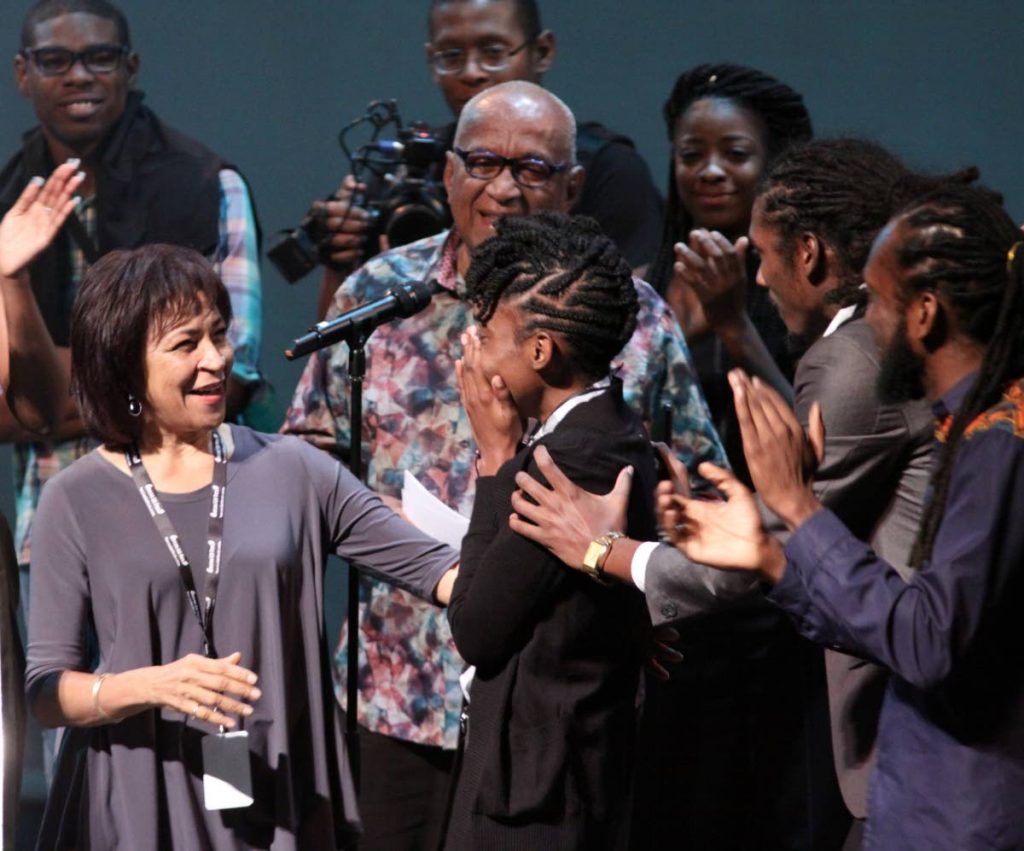Capitalising on our oral traditions

Sharda Patasar
It was one of the best ways to spend last Sunday. The NAPA auditorium was full – I was actually surprised at the attendance. But this wasn’t just any poetry event. It was the finals of the First Citizens National Poetry Slam, an event that also marked the closing of the Bocas Literature Festival 2018 which ran from April 25-29.
I must begin in the spirit of confession. This was my first time at the competition. Not that I haven’t heard some of the poetry but my general focus has rarely been on poetry events except when friends were performing or giving a reading. This time, however, I had been invited as a judge. Because I believe in the guidance of the universe, there was a reason for being there and a reason that I also had not refused as I am tempted to do most times when a public appearance is involved. However, Nicholas Laughlin’s and Funso Aiyejina’s names are enough for one to agree to shed inhibitions for an evening and commit to walking through the door to a packed auditorium.
Though there was no age limit for competing, the final contenders were all young people. (I qualify young here as teenagers to 30s). If they are any indication of the trend of thinking among the youth population, then the intellect of the nation is in a truly progressive place.
As I sat there, thoroughly enjoying the spoken word performances, I thought if anyone around me lamented the death of calypso I would tell them to attend the Poetry Slam next year. It seems that I was not the only one whom this thought had hit. Fellow columnist Colin Robinson – it was only on Monday, the day after the competition, that I read his Sunday column and ruefully noted that my thinking wasn’t original – had as well, and so it is only further evidence that these young poets were indeed the future of an art form that is a viable replacement for calypso in a contemporary Trinidad. Colin’s Where Calypso Gone (Sunday Newsday, April 29) is a must read for he provides an intimate insight into competition as well.
It was a difficult task judging a competition where each competitor came with a high standard of craftsmanship. One of my favourites was Deja Lewis’s Trinidad is Not a Place a mixture of lament and humour that made for an entertaining piece on Trinidadian behaviours. Though it didn’t place in the top three, it nevertheless remains with me for what I consider its dark humour.
The skilful handling of language made these performances a joy to witness. Jabs at politicians, the young boy who chopped his mother for confiscating his phone and the LGBTQIA issue were major features of the poets’ works. All topical and current. And well Kunti has now become a verb, as one of the judges noted. We were all humoured by the reference that popped up in more than a few instances.
Among the poems that stood out – Kyle Hernandez’s use of the Christ metaphor to speak about hypocrisy in relation to the LGBTQIA issue. It came to a brilliant end with the observation that Christ too was crucified as a result of this very attitude of self-righteousness, an attitude that is intolerant of other views and assumes itself to be the right one.
Deneka Thomas’s winning piece used the closet to convey a message about a space once reserved for prayer and contemplation now turned into a space in which secrets, personal views, the fear of difference (in a brilliant use of the Harry Potter story) are all hidden and from where things wish to escape. Dealing with the LGBTQIA issue, it’s skilful manipulation of the closet image from medieval times to present, sent the audience into a roaring applause.
TT is a fertile place for spoken word to flourish. As a nation whose cultural heritage is steeped in the oral traditions, it is no wonder that the art form has a place here. Calypso, now an established literary form, thanks to the pioneering work of Professor Gordon Rohlehr and others who followed, now has a successor and an able one at that. One finds a new consciousness arising out of these young artists and consciousness that seeks to find balance in the way it sees the world.
If the words of those sixteen contestants reflect the trajectory of thinking among the youth, then we can all sit back and be satisfied that there is a progressive future ahead. And I suppose my reason for being there was to regain some semblance of hope that there are pockets in which good sense and an attempt at conscious living still exists.


Comments
"Capitalising on our oral traditions"